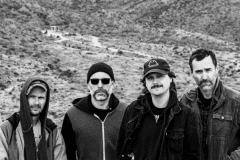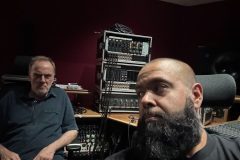Daniel Brady Lynch is no stranger to the indie rock scene. Born and raised outside of Savannah, Georgia, Lynch has developed numerous projects that have showcased his vast array of influences and genre-bending focus. From the electronica machine Sunglow to his Chicago-based two-piece garage rock outfit The Lipschitz, Lynch explores different methods when it comes to the songwriting that keeps him from getting comfortable.
Lynch’s latest project Bummerville and the band’s debut self-titled album (released in January via Graveface Records) was crafted together uniquely. Written and recorded piece by piece on the time of the song’s creation, the album encompasses a spontaneous and free-flowing flow that possess their independent persona. Garage punk sound blasts through melodic vocals within the tracks, all while keeping things fast and loose.
We spoke with Lynch recently to learn about him, the album’s creation, and much more.
When did you start writing and recording your own music?
I started writing my own music on a computer in 2005. I was 15 at the time and had a little project called A Hero in History. I utilized MySpace as heavily as I could to network online and was actually able to spread my music around and network pretty successfully back then, which is fun to think about in retrospect. Simultaneously I started playing drums in full bands, but never quit writing my own stuff electronically, eventually trading in a DAW for a sequencer/sampler/synth set up. That style of writing/recording and the experience of being in live bands the past 10 or so years has coalesced into this Bummerville experience.
What has the move to Chicago done for you, musically? Has it influenced you in a variety of ways?
I feel it must have an inevitable impact, but it’s really hard to tell. I didn’t make much of a lifestyle shift when I moved up here. I play as much as I can, produce albums, and tour as I would have in Savannah. Chicago is refreshing in the way that I see 10x the amount of people working out their own stuff. It’s inspiring in the way that it keeps me focused and stops me from getting complacent or lazy.
What was your primary goal with the production of Bummerville?
I didn’t really have a goal with this. Songs accumulated on me pretty rapidly once I started doing all the recordings for the full bands I was in. I would lay down the drum skeleton and then immediately start working the song out until I was happy with it, then move to the next idea. I wanted the outcast tunes to have their own personality, so once the finished material started stacking, I started to get a more clear picture of what was going on with the project. I guess that was the goal, sort of like making a new box for my freedom to write. Saying that whatever didn’t make it wouldn’t go to waste, it would go in this box.
How much of Bummerville is comprised of songs that didn’t fit into your other projects and what’s new?
All of it. I still don’t sit and write for this project, but I had an album’s worth of new material since Bottom Feeder was finished. Usually it’s a given what will end up being Bummerville, but even in the case of a speed demon like ‘Blow Money’— that song wouldn’t make total sense in one of the blown-out projects I’m involved in like The Lipschitz, Bodyplex, Greta O and the Toxic Shock, or any of the CBI stuff, so it goes here.
During the production, you enlisted a lineup that included your brother. What was the experience like working with family?
The production of the music was all done myself, but I asked Derek to play bass for me on tours. I’ve written and performed with my brother since I started doing music [ he’s actually the one who inspired me to start playing ], so it was the most comfortable experience as always. Plus I knew he was the person to ask in handling the bass riffs, which are grueling at times. Derek is a phenomenal guitar player and songwriter.
For the songs on the album, you wrote and recorded right on the spot. What challenges did this cause with the movement of getting the album done?
Honestly, it was only tough in the sitting still and accepting that it was done parts. I almost lost my lunch when I had to confirm the finalized tracklist. I wrote all the songs as they came — even at the time Graveface expressed interest in working with me, and up until a month before the album came out. “Salsa for DarkStar88” was written two months before the album was done, and was added only a few days before the album was sent to get pressed. I wanted every new thing to be involved. Knowing I had to take a break for a second to say “It’s done,” then promote it and tour it got me a bit restless, but now I’m back grinding.
Overall, what was the time process for the creation of Bummerville?
I wrote a few songs, put one online under my own name. At that point, Graveface expressed interest in the song and wanted to hear what else I had. I sent every song I had up to that point, and as I said earlier, molded a few new songs out during the process of getting the record prepared. All in all, it was about a year or so from the moment “Time That it Takes” was uploaded to the album being pressed.
Do you find yourself feeling like you are stretching yourself out thin at times, since as how you are on various projects?
Could be, but I’m so behind on everything I want to do that it’s impossible for me to come to terms with it. Who knows, I could scale back and write music for 1 or 2 projects and have nothing change. It’s hard because at any point I’m not getting something made I’m feeling like an absolute wastoid.
Bandcamp | Facebook







Social Media